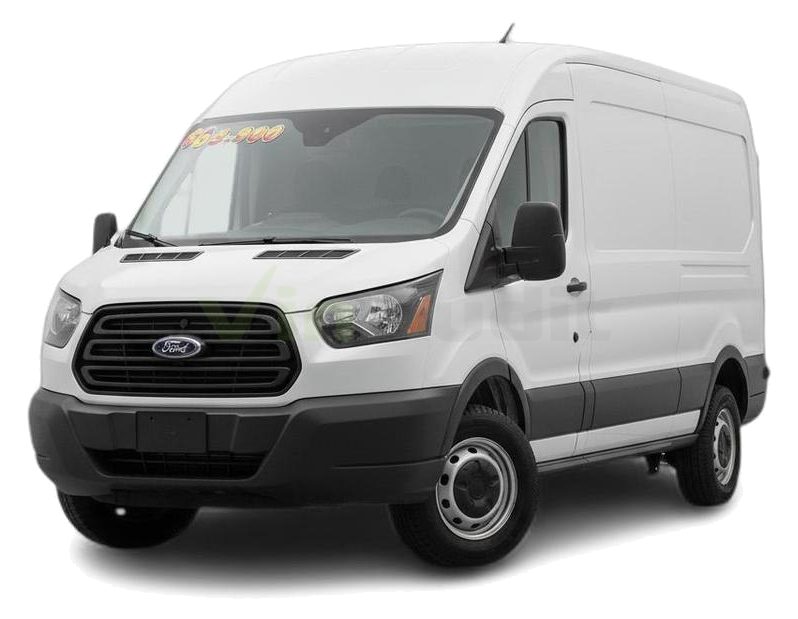The Good
The 2019 Ford Transit offers impressive cargo capacity and flexible configurations, appealing to practical buyers needing a reliable workhorse. Its available powerful engines provide ample performance for heavy loads. Emotional appeal comes from its role as a dependable partner for businesses, ensuring smooth operations and a comfortable ride for both drivers and passengers. Efficiency is respectable for its class, contributing to lower operating costs and strong value.
The Bad
Known weaknesses for the 2019 Ford Transit include its somewhat utilitarian interior styling, which can feel dated compared to some rivals. Fuel economy, while decent for a large van, can still be a concern for high-mileage operators. Some owners report issues with specific powertrain components and potential rust concerns in certain climates over the long term, making vigilance important.
2019 Ford Transit: Quick Overview
Here is a bullet-point summary of key specifications for the 2019 Ford Transit:
- Engine Options:
- Standard 3.7L Ti-VCT V6 engine, offering a balance of power and efficiency.
- Optional 3.5L EcoBoost V6 engine, providing enhanced power and torque for heavier loads and more demanding tasks.
- Optional 3.2L Power Stroke I-5 Turbo Diesel engine, known for its strong low-end torque and better fuel economy, especially under heavy loads.
- Horsepower:
- 3.7L Ti-VCT V6: Approximately 275 horsepower and 260 lb-ft of torque.
- 3.5L EcoBoost V6: Approximately 310 horsepower and 400 lb-ft of torque.
- 3.2L Power Stroke I-5 Turbo Diesel: Approximately 185 horsepower and 350 lb-ft of torque.
- Fuel Economy (EPA Estimated):
- Fuel economy varies significantly with engine, body style, and roof height. For the 3.7L V6, estimates are roughly 14-15 MPG city and 18-19 MPG highway.
- The 3.5L EcoBoost V6 offers similar or slightly lower figures due to its performance focus, around 14-16 MPG combined.
- The 3.2L Power Stroke Diesel generally offers better fuel economy, especially on the highway, with estimates typically in the 18-20+ MPG combined range, though official EPA ratings for commercial vans are often not provided in the same manner as passenger vehicles.
- 0-60 Times:
- As a commercial van, 0-60 times are not typically a primary metric. Estimates for the 3.5L EcoBoost can be in the 7-8 second range when unladen, while the 3.7L V6 and diesel would be slower, generally 9-11 seconds or more, heavily dependent on cargo load.
- Towing Capacity:
- Towing capacity is robust, varying by configuration. Maximum towing capacity can reach up to 7,500 lbs when properly equipped with the 3.5L EcoBoost V6.
- The 3.7L V6 and 3.2L Diesel also offer strong towing capabilities, typically ranging from 5,000 to 7,000 lbs depending on the specific setup.
- Trim-Level Features (configurations, as traditional trims are less relevant):
- Body Styles: Cargo Van (for hauling goods) and Passenger Van (for transporting people, up to 15 passengers).
- Wheelbases: Regular (130-inch), Long (148-inch), and Long-EL (Extended Length 148-inch).
- Roof Heights: Low, Medium, and High (offering interior standing room for up to 6'5" tall passengers in high-roof models).
- GVWR Options: Ranging from 8,600 lbs to 10,360 lbs, influencing payload capacity.
- Standard Features: Rearview camera, power windows/locks, air conditioning, AM/FM stereo with auxiliary input.
- Optional Features: Ford's SYNC 3 infotainment system, navigation, cruise control, power-adjustable seats, dual sliding side doors, rear parking sensors, trailer tow package, advanced safety features (see prompt 7).
- Interior Configurations: Cargo vans offer various upfit options, while passenger vans come with multiple seating arrangements and removable seats for flexibility.
2019 Ford Transit Specifications
Vehicle Information
| Year | 2019 |
| Make | Ford |
| Model | Transit |
| Trim | - |
| Style | High Roof |
| Type | Van |
| Category | Heavy Truck |
Manufacturing Details
| Made In | United States |
| Manufacturing City | KANSAS CITY |
Dimensions
| Doors | - |
| Curb Weight | - |
| Gross Vehicle Weight Rating | 4082.33 kg |
| Overall Height | - |
| Overall Length | - |
| Overall Width | - |
| Wheelbase Length | - |
| Standard Seating | 2 |
Engine & Performance
| Engine | 3.7 L Regular Unleaded V-6 |
| Engine Size | 3.7L |
| Engine Cylinders | 6 |
| Transmission | 6-Speed Automatic |
| Transmission Type | Automatic |
| Transmission Speeds | 6-Speed |
| Drivetrain | Rear-Wheel Drive |
Additional Features
| Anti-Brake System | Standard |
| Steering Type | - |
Pricing
| Manufacturer Suggested Retail Price (MSRP) | - |
| Invoice Price | - |
| Delivery Charges | - |
Vehicle History Report
Specifications
History
Events
History Check
Check
Check
Check
Check
Listings
Recalls
Check
Analysis
What Problems Does the 2019 Ford Transit Have?
How long will the 2019 Ford Transit last?
What Technology & Safety Features are Included?
What Colors Options are Available?
2019 Ford Transit Prices and Market Value
2019 Ford Transit Cost of Ownership
2019 Ford Transit Fuel Efficiency
2019 Ford Transit Safety Rating
NHTSA
2019 Ford Transit Warranty
Basic
Powertrain
Rust
2019 Ford Transit Insurance
reasonable repair costs.
How Does the 2019 Ford Transit Compare to Other Van?
- Performance: The Transit's available 3.5L EcoBoost V6 often outperforms rivals in sheer power and acceleration, offering a more car-like driving experience than the ProMaster's FWD-focused platform or the NV's older V8. The Sprinter's diesel engines offer superior fuel economy and torque, especially for heavy loads, but with a higher initial cost.
- Features: The Transit's configurability with multiple roof heights and wheelbases is competitive, matching or exceeding the ProMaster and NV. Its optional SYNC 3 infotainment system with Apple CarPlay/Android Auto was more modern than some base offerings from rivals. The Sprinter, however, often leads in advanced driver-assistance systems and interior refinement, though at a premium.
- Reliability: All commercial vans are subject to heavy use. The Transit's powertrain options are generally robust, but the EcoBoost and diesel can have specific, albeit manageable, long-term issues. The Ram ProMaster, with its simpler FWD powertrain, can be less prone to certain driveline issues. The Mercedes-Benz Sprinter is known for its durability but can be expensive to repair outside a dealership network. The Nissan NV, while older, offers a very traditional, truck-based reliability with simpler systems.
- Price: The Transit typically slots in the middle of the pack. It's usually more expensive than a Ram ProMaster or Nissan NV when new, but less costly than a Mercedes-Benz Sprinter, especially when factoring in maintenance and parts costs. Its strong resale value helps offset initial investment.
Similar Alternatives:
- Ram ProMaster: Offers a lower loading floor and FWD, making it excellent for city driving and conversions. Can be a more budget-friendly option.
- Mercedes-Benz Sprinter: Premium option with excellent fuel economy (diesel), superior ergonomics, and advanced tech, but with a higher price tag and potentially higher maintenance costs.
- Nissan NV Cargo Van: A more traditional, truck-based approach with a rugged V8 option, known for reliability but lacks modern features and fuel efficiency compared to the Transit.
The Transit strikes a strong balance between capability, technology, and cost.

